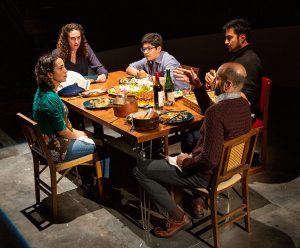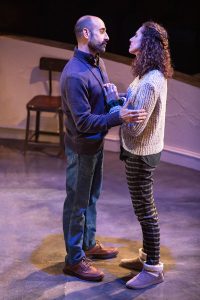Making the Culture Leap From Middle East to Middle America
Those of us who live life in the well-worn tracks of our forebears, assuming that order and safety are inevitable circumstances of our heritage, must deal somehow with grim reports from appalling elsewheres ripped by a cruel chaos that defies belief.
There are places, right now and today, where fellow human persons are discarded, starved, shamed, tortured, maimed and killed by others, driven by incomprehensive forces than overflow a simple word like “evil.”
The best we can do is some mixture of sympathy, compassion and charity, rejecting any hint of superiority, as we try to understand the unthinkable.
That’s what Heather Raffo’s play Noura, now at the Old Globe, labors to do: Witness the most raw and intimate climaxes of lives lived in transition from the Mid-East to Middle America.

Isra Elsalihie, Lameece Issaq, Giovanni Cozic, Fajer Kaisi and Mattico David in Noura at The Old Globe. Jim Cox Photos
It’s Christmas Eve in Queens, and the three brand-new American passports on the cluttered dining table, products of unspeakable bureaucratic exertions, are anti-climactic. An excess of bright presents is under a tall tree, ritual feasts have been in preparation for days and “Jingle Bells,” in Arabic, plays from the radio. Tareq (now “Tim” for citizenship purposes) is a former surgeon who has worked his way back to accreditation as an ER physician. Noura (now “Nora”) is an architect who tutors kids. Their own son Yazen (“Alex”) is a total but respectful American kid passing puberty and hoping for a Play-Station.
They’re from Iraq but they’re Christians. Their best local pal, who grew up in Mosul with Noura, is a Muslim OBGYN. The festive gathering is not like the old days when cousins by the dozens crowded the table but there is another guest expected: An orphan whom Nora and Tarec have supported but never met since her infancy in a Mosul convent. The young woman is at Stanford on a D.O.D. scholarship to develop weapons; “They pay people to do physics,” she shrugs.
As happens on holidays under stress, fragile structures of unspoken collaborations collapse and, for better or worse, nothing will ever again be the same. But that’s the point, really. “Truth is a pathless land,” as the playwright quotes the Indian philosopher Jiddu Krishnamurti in her script. The snarl of detail in these lives suggests depths of incomprehensible complexities unlikely to be sorted out in just a few lifetimes. “Just because it’s true,” somebody says, “doesn’t mean you speak it.”
These are survivors of destructions hard to envision. In their own personal memories are guns and blades and body parts and savagery. Processing authorities in their flight assume they’re all victims. Surviving family have lost contact. Libraries have been burned. Massacres are old news. And always the choice between self and family and culture.
“The people changed,” says the Muslim doctor. “The middle class turned tribal.”
That regression from an ecumenical past with room for all sorts of beliefs is what stains darkly this whole story these days. And America’s reaction, notwithstanding the violence projected this way in the name of religion, is becoming more twisted, too. With the gains in individual rights and freedoms has come an ugly polarization of community attitudes quite at odds with inherited American values. This hell of destruction might next be ours.
In many ways, Raffo’s play is as big a mess as the world it evokes. Fragments of aural memories and tactile feelings float through in a manner sometimes arresting but often tedious. People seem to blow up as readily as they revive, suggesting a world too volatile for meaning. Surprise character inconsistencies need either to be backed off a bit or better examined.
These are interesting people, though, interacting often with moving plausibility. And director Johanna McKeon has found ways to inject fragments of choreography and timing of pauses into their casual movement which deepen and underscore the author’s intentions.
She has a cast sensitive to the subtleties of the play’s whispers. As Noura, Lameece Issaq chews endlessly the bitter rot of self-disgust for a wrong never revealed for righting. It’s what drives her in a nervous tension of thwarted creativity and unrequited duty. Mattico David vibrates in sympathy but writhes himself at the mounting contradictions of who he feels he must be.
As the family friend, Fajer Kaisi is guarded and dignified. Isra Elsalihie finds the hair-trigger and defiance of a smart underdog’s need to prove herself and Giovanni Cozic is exactly the kind of kid you call for help with your computer.
Andromache Chalfant’s set is almost too blah and casual, especially the Christmas tree hanging from the ceiling (realities of the Globe’s White Stage) but Dina El-Aziz gets the costumes pretty much just right. Driscoll Otto’s lighting helps the dreamy abstracts work as well as they can.
This play can be effective without getting into the twin malevolencies of religion and politics but one final admission needs to be recorded. The characters here are upper middle-class, about what one might expect in a typical Globe audience also. And it makes one wonder: If these are the dilemmas of the educated and financed folk, what about the poorer classes? Shudder.
(Continues in the Old Globe’s Sheryl and Harvey White Theatre at 7 p.m. Tuesdays, Wednesdays and Sundays; at 8 p.m. Thursdays-Saturdays; and at 2 p.m. Saturdays and Sundays through Oct. 20, 2019.)
.

Welton Jones has been following entertainment and the arts around for years, writing about them. Thirty-five of those years were spent at the UNION-TRIBUNE, the last decade was with SANDIEGO.COM.



